Do you ever feel yourself slipping away financially over time despite working your arse off? And what about the feeling that no matter how hard we work, our parents seem to have had it easier? Well if you always suspected wealth erosion was going on but couldn’t put your finger on it, then maybe this exposition from Slate can give you some points to ponder. I thought it was pretty thought provoking. It’s actually jampacked with information, but hopefully I can put down some of the salient points of the article here.
You can put stock in the statement that “the rich get richer, the poor get poorer” (also called “The Great Divergence”) after taking a hard look at the discussion by Timothy Noah. Whatever suspicions you had about income inequality are echoed and supported by his findings. Let’s see if I can summarize some of those points.
- In 1915, the richest 1 percent in America generated 15 percent of the nation’s income. Today, the richest 1 percent produce 18 to 24 percent.
- Incomes had more convergence from 1940 through 1973, where distribution appeared to be more across the board. From 1979 onwards, the gap between the rich (or high income folks) and the rest of the nation widened.
- The top 1 percent earn an annual income of $368,000. Over time, the share of national income for this group has grown from 8% in 1973 to 18% in 2008. The rate of income acceleration picked up in the mid-1990s. Education level (having a college degree) did not seem to have any impact on your income situation either.
Here are more findings by way of awesome charts from VisualizingEconomics.com.
Global trends and Income Inequality. Are global trends a factor in income inequality? The answer is not too clear, given the differences you see between the U.S. and other countries on this front.
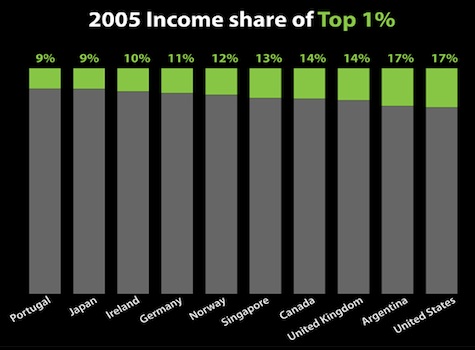
Race and Income Inequality. Here is the outlook on median income differences, by race.
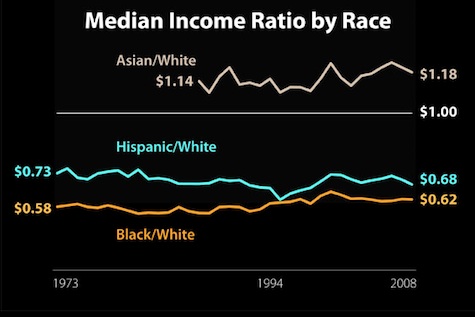
Gender and Income Inequality. Good to know that the income gap between men and women appears to be shrinking. More on this discussion in our post on traditional jobs for men and women.
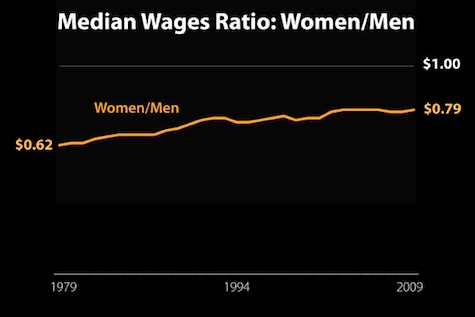
Taxes and Income Inequality. It also does not look like tax rates have had as much influence on the income gap (or “The Great Divergence”) as we’d think.
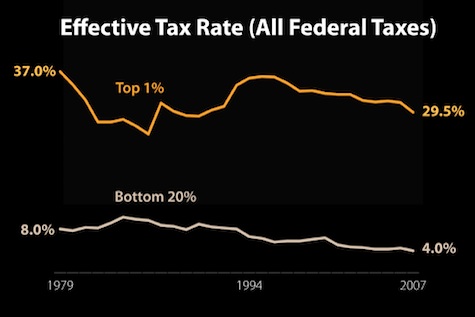
Education and Income Inequality. When education levels plateau, income levels become more unequal. It was interesting for me to encounter the point that shared prosperity depends on rising education levels. So a flat line here points to greater income and wealth inequality.
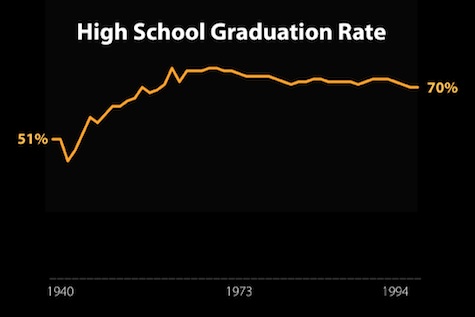
Politics and Income Inequality. Here’s a little political economics for you: is it any surprise that income growth rates under Democratic presidents were stronger than under Republican presidents? Interestingly though, the conclusion formed here is that greater income equality can coexist with greater prosperity. The claim is that equality may even lead to improved prosperity.
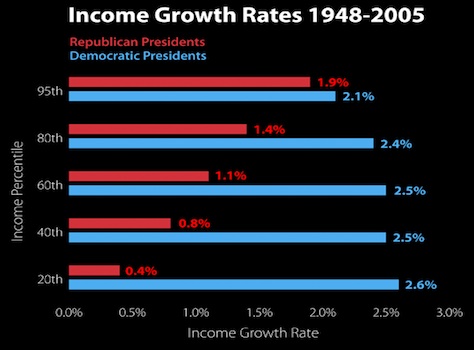
I’ve only touched on the major points. You can check out the article in much greater detail here.
How Rich Is Your Neighborhood?
Let’s tie all this in with our cost of living situation. The Slate article featured a tool that allowed you to gauge your standing against the rest of America. I entered a Palo Alto, CA zip code (for kicks). I wanted to use one of the most expensive zip codes in the West Coast (if not in the U.S.) as an example since we’re measuring against high income groups. I entered the average income you would typically make as a white collar professional in Silicon Valley and extrapolated that to a two income household. This would be around $200,000. Lo and behold, I was surprised to see that the average income in Palo Alto was much higher — $361,000? Who are these people? 😉 I have friends who live there and I hang out there on occasion, but I’m a bit surprised by the results of the tool.
Anyway, would love to hear your thoughts on the subject.
Copyright © 2010 The Digerati Life. All Rights Reserved.
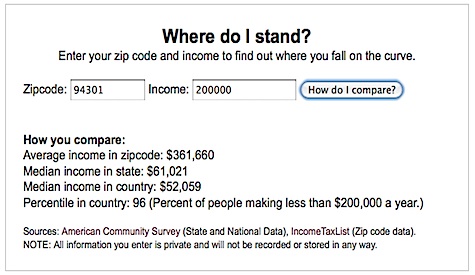

{ 17 comments… read them below or add one }
Funny how you picked Palo Alto. I’ve been there on several occasions and it looks like a very posh area….I’m going to have to try Beverly Hills, Brentwood, Bel Air, or Malibu too.
SVB,
For kicks I tried 90210 (ha!) and the average income was $500,000. Palo Alto needs to step it up! 🙂
@Eric,
What’s up with that? I can imagine Beverly Hills, but Palo Alto? A lot of working class folks in there! 🙂 Got lots of friends in that neighborhood who bought property at the right time (before things went ballistic in property prices over there). But $360,000 seems a little on the high side. I am wondering if the numbers in that tool are somewhat inaccurate? Or I better start thinking differently about some of these places! 😉
I wish I had a couple of days to tighten the writing on this, but if I don’t post it now, people will have forgotten the article by Monday, so here goes.
Unless I really misread your intention, the conclusion I came to in reading this article is that it is perfectly justified to steal the income of the rich through taxes, in order to redistribute it to the masses. After all, those fat cat corporations and their millionaire CEO’s, whose business management provide the livings for hundreds, if not thousands of people who would otherwise be unemployed because they have not created their own work. can “afford” to lose 80% to 90% of their income; they deserve to lose their income because they are rich and we are not.
Digerati, I like to read your site; you are usually pretty level-headed about entrepreneurship, so I’m still having trouble believing you posted this. You’re a blogger; you’re a business woman. We can assume that you, along with all other business people, are working your tail off, trying to succeed financially. The people who have succeeded very well; the Bill Gates and Warren Buffets, etc. do you honestly believe that they don’t deserve to keep the money they’ve created and be able to spend it the way they see fit? You don’t think they worked their tails off to get where they are?
May I point out something? The people who make horrendous amounts of money, even if they spend it on mansions and million dollar yachts, are still spending that money, and employing lots of people in the process. Even if they are not generous with their money, and many multi-millionaires are very generous, they are still providing a living for many, many people, and providing the financial support for many good causes. These people don’t deserve to be villainized and stolen from, simply because they are rich. Heck, I’m working for the day when I will be rich too, and there are an awful lot of things I can learn from (the honest) businessman. I don’t want to punish these people for being successful; I want to copy them.
It seems to me that part of the answer to the problem of “Income Inequality” is to encourage people to create their own work. And it doesn’t matter if they are male, female, white, black, Hispanic or bright purple; encourage people to start their own businesses, and learn to help each other succeed. Two hundred years ago, before the industrial revolution changed everything, very few people worked for somebody else, unless they were apprentices. What would America look like if most of us worked for ourselves? Crazy idea, isn’t it?
@Upset In Michigan,
Thank you for your awesome comment. I don’t know if you noticed but I did not give my personal opinion on this article. It was more of a summarization of points made by the Slate article. All the points I made were what was echoed in the article and I put this up for the purpose of discussing it. Even any references to politics here were lifted from the article itself. I am actually pretty fiscally conservative and very big on less taxes and less government. You can make conclusions about my leanings based on that statement! I also find it interesting that the study itself was made to scrutinize the income gap. Was the study made to fit someone’s agenda? I didn’t note it this way, but I am sure it will be interpreted differently by many others.
Really enlightening and informative article. I entered my income and was pleasantly surprised to see that a lowly teacher and substitute are pulling in with the top 40%. I would never have expected that.
I think the current economic situation has made us realize the importance of savings and not having enough is why we think that there is income inequality. With so many Americans suffering with foreclosures and bankruptcies this problem becomes more noticeable. I believe we won’t be talking about this if we had our personal savings as resources to navigate through this tough situation.
The article you link to is very unbalanced and, quite frankly, is misleading. Poverty is a serious issue and no one will argue otherwise, but the tired old “rich get richer and the poor get poorer” cliche does a disservice to efforts to reduce poverty because it is (i) simply not true and (ii) ignores a number of facts including:
1. the “rich” create most of the jobs and wealth – bash the rich (especially small business owners) and job creation suffers. If we want to create jobs we should encourage people to start and invest in SMEs – not inflict ever higher burdens (both taxes and compliance and regulatory costs);
2. the percentage of the US population which is officially experiencing poverty fell from (about) 22% in 1959 to 13.2% in 2008 (in absolute terms the number of people in poverty fell and then rose to be about the same over this time period): http://en.wikipedia.org/wiki/Poverty_in_the_United_States
3. the percentage of total Federal income taxes paid by the “rich” has grown significantly over the years: “In 2008, the top 1 percent of tax returns paid 38.0 percent of all federal individual income taxes and earned 20.0 percent of adjusted gross income.”
4. top income earners pay the majority of federal taxes: “The top-earning 5 percent of taxpayers (AGI over $159,619), however, still paid far more than the bottom 95 percent.”
5. poverty is currently measured on an absolute basis within a country (see link above) but is different for each country. There can be no doubt that, however unpleasant and difficult living in poverty is, there are probably a couple of billion people on this planet who would regard living in poverty in the US as being a significant improvement on their current circumstances.
The tax data can be found here: http://www.taxfoundation.org/taxdata/show/250.html
As is mentioned in the article, the key to this whole thing is opportunity. If you are born into an inner city slum or a poor rural town, your access to the marketplace of people and ideas that is required for success is miniscule.
There is a straight-forward way to address this. We should make it our goal to give all children a shot at the American Dream, and let adults fend for themselves.
When our goal is to equalize the condition of adults, we face two key problems:
Problem 1. We can’t afford it. We can’t provide everyone the same same health care and lifestyle that the rich can afford. Trying to do so would drain the economy and thus kill the engine which produces the wealth. (The Keynesian view, advocated by Paul Klugman, that simply giving people money to spend can drive the economy is wishful thinking. If it was true, we could all be infinitely wealthy simply by the government borrowing money and giving it to us to spend.)
Problem 2. Providing for equal results for adults lessens the incentives which are needed for people to work hard and be self-sufficient and innovative, also sabotaging our economic engine.
So, instead of all this money being spent on health care and social security for adults who can and should take care of themselves, we should spend that money on making sure all children can have the education and environment they need in order to gain the the skills, mindset, and connections to succeed.
This is the right approach for these reasons:
1. If American stands for anything, it stands for opportunity for all. And opportunity is best served early.
2. We know that it’s far more cost-effective to get someone on track early so they can lead a productive life, rather than letting them get off-course and trying to help them (or imprison them) later.
3. We know that the larger an economic market is, the better it is for everyone. So the more people we can get off the streets and into businesses, the stronger our economy will be.
I personally think the most effective way to do the above would be get the government out of the education and social welfare business, and, instead, give hugely generous school vouchers so that a dynamic marketplace of schools emerges so that under-privileged children can get a good education and integrate with the rest of society.
If there is equal opportunity for children, the disparity between incomes will decrease dramatically over time. And any remaining disparities will be the natural consequence of a free society of individuals interacting on a level playing field. And there’s nothing wrong with that.
But not doing our best to get all the kids onto the field in the first place … that’s just not right.
“I wanted to use one of the most expensive zip codes in the West Coast (if not in the U.S.) as an example since we’re measuring against high income groups. I entered the average income you would typically make as a white collar professional in Silicon Valley and extrapolated that to a two income household. This would be around $200,000. Lo and behold, I was surprised to see that the average income in Palo Alto was much higher — $361,000?”
I noticed that while the tool mentions the MEDIAN income for the state and country, it mentions the AVERAGE income for the zip code. Average can be a vague term, but if they are using the arithmetic mean, this would be skewed by outliers. Imagine that Bill Gates moved to Palo Alto. This would cause a very minimal change in the median, but a big change in the mean.
Let’s see…… the Pledge of Allegiance I learned in kindergarten says…… “……one nation under God….. with liberty and justice for all…….” Hmmm……. somehow this was missed in this thinly disguised premise that being an American does not guarantee FISCAL EQUALITY for all. Regrettably, merely being granted life, liberty and the pursuit of happiness isn’t enough for an increasing number of our citizens (not to mention the vast numbers of our illegal “guests” being supported by our taxpayers.)
The shift to the nanny state mentality has, at it’s foundation, the ideal of wealth redistribution. Living close to Chicago, during the 2008 election I heard the hours of interviews on the radio where our now President elect discussed his belief in social justice. This was clearly echoed in the semons of his former pastor, Rev. Wright. It’s obviously become the compass guiding the political agenda of the last 2 years under his leadership. I can’t help but notice how many times Mr. O. tells corporate America that he intends to “punish” them for their actions. This translates to wielding unprecedented control and extracting $$$ from them.
Thankfully, the voters have voiced a hearty disapproval of the direction we’ve been headed in – which is nothing less than socialism. Europe is just waking up to the consequences of their own pursuit of this agenda. There’s much to be done to undo what we’ve already got going on here. Going back to the ideals of the Founding Father’s and the Constitution must become the compass we chart our future by.
Let the “have nots” do what the “haves” do – go to school, and work to make something of themselves. It’s not just having fiscal equality – it’s really about how a person comes by the funds they live on.
@ Alex B
” If you are born into an inner city slum or a poor rural town, your access to the marketplace of people and ideas that is required for success is miniscule.”
I’m not sure I agree with this. I grew up on a small dairy farm in Iowa. My parents scratched out a meager living (when the weather was good) or a loss (if the weather was bad). My high school had some good teachers, but didn’t provide the opportunities of larger schools. It did, however, have a library (as did the small town where I lived).
I financed my way through college through a combination of part time jobs, scholarships/grants, and a healthy dose of student loans. My parents didn’t provide any financial assistance. It wouldn’t have been realistic to expect them to pay any of the bills. I became the only member of my family (8 kids) to graduate from college, earning dual BS degrees in 4 years. Neither of my parents made it past 8th grade.
For the past 13 years, I have worked in IT for a large, well-known company. I work alongside people who had a much more comfortable lifestyle growing up. When has there ever been more opportunity to pull yourself up by your bootstraps?
SVB, Wow, nice article on income distribution and inequality. I particularly like the info on gender and race. We are making progress on women’s economic equality which I can see happening before my eyes, but on the opposite side is the gap for disadvantaged minorities such as Blacks and Hispanics. Not sure if the minority income inequality gap will be solved.
Finally, love your thoughts on income growth rates under Democratic and Republican presidents and the fact that overall income growth rates under Democratic presidents were stronger than under Republican presidents. I do believe greater income equality can coexist with greater prosperity for all.
I wonder though, according to the data, if there is any shift in wealth and where the income growth comes from depending on the party in office–for instance do the top 1% benefit more under Republican presidents and do the poor benefit more under Democratic presidents? Any data on this? Of course I have my own non-data based thoughts on this question. I may have to research this.
Interestingly though, the conclusion formed here is that greater income equality can coexist with greater prosperity. The claim is that equality may even lead to improved prosperity.
I strongly believe this.
The thing that has made us so rich a nation for so long is that the average person feels that he or she has a chance to make it up the ladder and knocks himself or herself out trying to do so. If we lose that (there are signs that we are in the process of doing so, but I sure hope not) we lose what makes us special, in my view.
Rob
Digerati: I’m going to apologize for my comments yesterday. You are absolutely right; I jumped to the conclusion that you supported that position just because you printed it. You’re right, you didn’t give your opinion one way or another. Thank you for dealing with it so graciously instead of calling me a jerk and deleting the post, like I probably deserve. I guess I hear that destructive line of reasoning so much from the you-know-what side, it scars me. If we as a country make all successful capitalists into villains, and allow capitalism to die, history teaches us that we will never be able to get it back.
So yes, I apologize for assuming you had fallen for the crap and were leading everyone who reads this posting to do the same. Judging from some of the comments I read here in general, there are a lot of independent small business people who read this site. And from the comments I read on this issue, most of them are very level-headed people. Trainee Investor, Smarty and Kosmo, and Digerati, of course, I cheered when I read your comments!
@Marly,
Thanks for the spirited discussion! I appreciate the apology. I suspected that this would be a topic that would potentially incite some strong opinions and which could give us points for debate. I, for one, welcome the different points of view by lots of folks here and I learn quite a bit from hearing from both sides. For instance, being moderately conservative, I was quite surprised by the results for income disparity that were attributed to Democratic vs Republican “rule”. But presidency doesn’t necessarily equate to “rule” (or the government), does it? Again, studies can have their slant to benefit certain arguments (or an agenda), but it’s certainly a good way to get a discussion going. I agree with Alex B when he says that a big part of this is about opportunity. Inequality will always exist in a capitalist society, but we try to address it by providing opportunity where we can (starting with those places with a broken school system).
I think vocabulary is a bit of an issue here: “In 1915, the richest 1 percent in America generated 15 percent of the nation’s income.” “To generate” means something like “to give birth to”. In the economy, to generate would mean to produce, and more specifically to produce or deliver material goods, as they, and only, they sustain human existence. So apart from some top surgeons, very few of the highest earners “generate” anything: according to your ideological stand, you could say “reap” or “plunder”. It is certainly a matter of wonder that the immense majority of the highest earners do not produce anything, but the explanation is certainly not to be found in any “economic” worth of what they do; rather, in the money they may bring in for investors either because they are themselves merchandise (think of stars) or because of their positions as traders or (wage) slave-drivers – or just investors feeding on capital gains, dividends and the like .